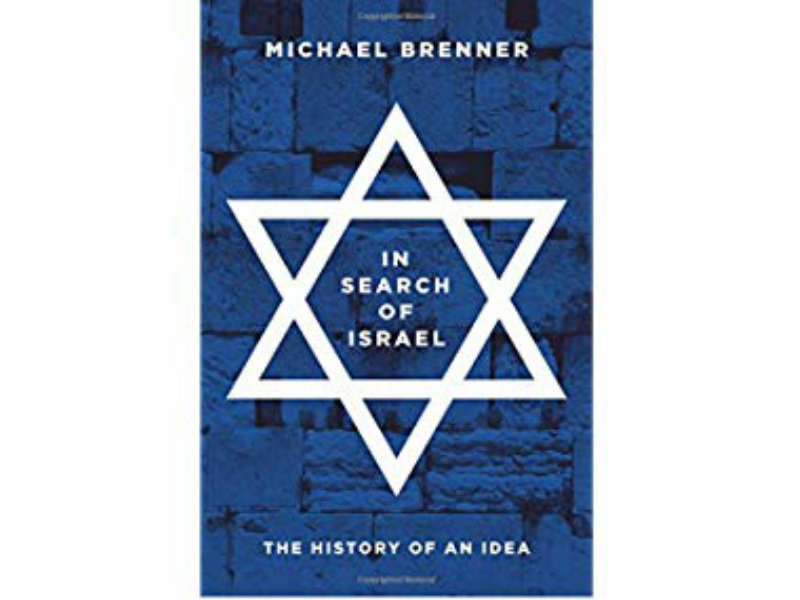There is an instructive notion in Jewish tradition that describes both a heavenly Jerusalem and an earthly one. The former encompasses the ideal; the latter depicts the actual. Heavenly Jerusalem is an aspiration, as well as a hope. Earthly Jerusalem is a work in progress, sometimes messy, but always advancing.
Michael Brenner makes note of this ancient literary allusion in the first chapter of In Search of Israel. Indeed, the comparison between dream and reality forms the heart of his remarkable new work. Time and again, he points to the dichotomy that was the emotional inspiration for the State of Israel: should it be a “normal” state like every other, or a model state – a light unto the nations delivering a divinely inspired mission for the sake of bettering the world?
Brenner explicitly informs the reader that the exploration of the territory between dream and reality is his purpose: “This book traces the tensions between particularistic and universal elements in the idea of a Jewish state by recounting how Zionist visionaries imagined such a state and how Israeli leaders implemented these ideas over the course of a century.… It is the story of the real and the imagined Israel, of Israel as a state and as an idea.”
In Search of Israel is compact, tightly written and thoroughly researched. It is essentially eight discrete seminars on the State of Israel. These seminars weave seamlessly in chronological order, beginning with the competing ideas that fought for supremacy when the country was founded and ending with an examination of the demographic, societal and political pressures buffeting the state today.
It is also a trove of archival nuggets that many will likely be reading for the first time: the Christmas tree in Theodor Herzl’s home; the Dominican Republic’s exceptional response to the Jewish refugee crisis at the Évian Conference in 1938; the deeply Judaic content of David Ben-Gurion’s speech to military leaders in 1950; and much more.
Brenner is comprehensive without being dull in bringing together original statements from a broad collection of disparate voices on all manner of subjects relating to Israel. He describes the reactions within the evolving state throughout its 70 years of existence, as events, situations and predicaments slam into it with metronomic regularity.
The book is like a reviewing stand at a parade, past which some of the greatest luminaries of the past century and a half – thinkers, writers, scholars, clerics, novelists, activists, diplomats, politicians and soldiers – unfurl their philosophies and concepts for discussion. In any given chapter, Brenner presents and explains some of the core notions of the era’s primary thinkers.
For example, in the chapter titled “Original Israel,” he includes statements from the many scholars consulted by Israel’s first prime minister, David Ben-Gurion, in order to guide the discussion of “Who is a Jew?” for the purposes of the Law of Return. This includes suggestions from S.Y. Agnon, Ernst Simon, Shmuel Hugo Bergmann, Alexander Altmann, Isaiah Berlin, Harry A. Wolfson and Haim Cohn, to name a few. The same holds true in every chapter, with quotes from some of the finest minds in modern history.
Brenner concludes that the 70-year-old democracy is indeed a success story, though he does not suggest why that is so. However, Prof. Shlomo Avineri, in his review of In Search of Israel in the Jewish Review of Books, provides a refreshing insight:
“Israel is one of almost a hundred new nations that have gained independence since World War II.… Today, most of them are one-party states, military dictatorships or communist, semi-fascist or personalistic authoritarian dictatorships – or a combination of the above. By the Political Science 101 textbook, Israel should have long ago ceased to be a democracy.… Yet it did not descend into a military dictatorship or an authoritarian one-party state. It continues to be a raucous and contentious multiparty, open society.…
“The reasons for the resilience of Israel’s democracy cannot be found in any religious texts or the experience of ancient Jewish commonwealths. Nor can the roots of Israeli democracy be found in the tradition of the countries from which the first immigrants came, most of which were not democratic.…
“Yet there is a Jewish tradition that undergirds Israeli democracy: the tradition of self-governance in Diaspora Jewish communities. In order to survive and guarantee Jewish life, Jews had to develop voluntaristic communities (kehilot). Whether in Krakow or Casablanca, in Berlin or Baghdad, if Jews wanted to have a synagogue, a school for their children, a cemetery or a social fund for their destitute members, the only way to achieve their goals was to set up a community (kehila), elect officers, impose voluntary taxes on themselves and appoint rabbis and teachers.…
“In 1948 the nascent State of Israel did not have to reinvent the democratic wheel. The institutions were there. The self-governing authorities of the Jewish community in Mandatory Palestine, headed by David Ben-Gurion, became the provisional government of the independent Jewish state, which then held within a few months – in the middle of the War of Independence! – elections for the first Knesset. This is not normal – no new post-1945 nation had such a deeply anchored institutional representative and democratic infrastructure.”
READ: BEN-DAT: ISRAEL ON THE BRINK
Brenner concludes his book with this observation: “In its eighth decade, the State of Israel is both a better and a worse place than its founders had envisioned. It is a vibrant and dynamic society, but still it searches for peace and harmony. It is the only democracy in the Middle East, but it is not a democracy without flaws. It is a place of hope and a place of despair. It is unique and it is normal. It is a state like any other state and it is a state like none other.”
In Search of Israel might help readers understand why this tiny 70-year-old country is so unique, and why it has drawn the focus and attention of people all around the world.
